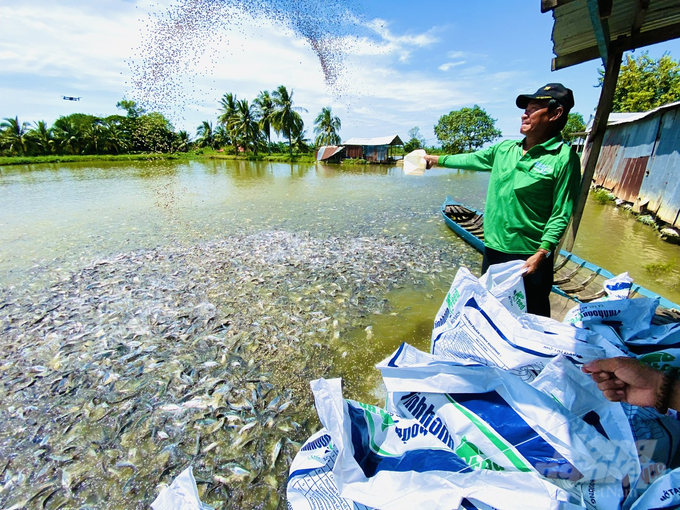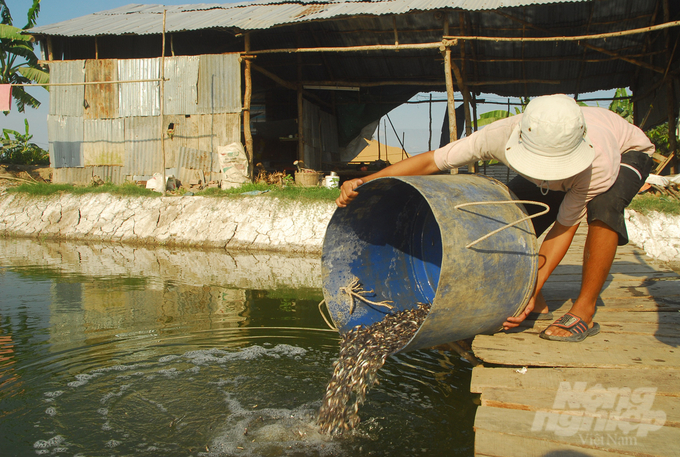November 23, 2025 | 12:57 GMT +7
November 23, 2025 | 12:57 GMT +7
Hotline: 0913.378.918
November 23, 2025 | 12:57 GMT +7
Hotline: 0913.378.918

With the aim of enhancing the efficiency of pangasius fingerling production, the agricultural sector encourages fish farmers to utilize vaccines during the finglering stage to minimize disease outbreaks and achieve optimal quality. Photo: Le Hoang Vu.
An Giang province produces a significant volume of commercial pangasius in the Mekong Delta region. Accordingly, An Giang province dedicates 1,200 out of its total 5,500 hectares to commercial pangasius farming, with an average yield of 450,000 tons and a value of nearly 380 million USD.
Mr. Nguyen Van Thanh, the owner of a pangasius fingerling production facility in Vinh Hoa commune, Tan Chau town, An Giang province, has over twenty of experience in the industry. He expounds that after an extended period characterized by a devaluation of pangasius fingerlings, where prices ranged within the lower bracket of approximately 25,000 - 26,000 VND per kilogram (pertaining to the 30 fish per kilogram category), the pricing dynamics of pangasius fingerlings in An Giang province have exhibited an upward trend, resulting in profitability for pangasius fingerling farmers.
At present, the 30 fish per kilogram variety has garnered attention from traders, who are procuring these fingerlings at prices ranging from 29,000 - 32,000 VND per kilogram. This signifies an increase of 4,000 - 5,000 VND per kilogram in terms of prices compared to that of two months prior.
According to the Directorate of Fisheries under the Ministry of Agriculture and Rural Development, the Mekong Delta region houses has 103 pangasius fingerling production facilities. Accordingly, there are at least 1,913 nursery facilities primarily located in the provinces of An Giang, Dong Thap, Long An, and Can Tho city.
Mr. Thanh delineated that the resurgence in pangasius prices can be attributed to a supply deficit in combination with an escalating demand, thereby inducing an augmented fervor within the pangasius fingerling market. Market participants are currently inclined to purchase pangasius fingerlings without exhibiting bias towards school size or disease-free fingerlings, as they aim to secure the entire inventory for subsequent resale.
The surge in demand for pangasius fingerlings can also be attributed to the current meteorological conditions prevailing in the Southwestern region, which is currently experiencing a heavy monsoon season. Consequently, fingerlings exhibit relatively low quality after developing from their fry stage.
In addition to weather-related factors, abnormal fluctuations in water temperature within the rearing ponds, exacerbated by the persistent rainfall, have led to the onset of diseases. Subsequently, these factors increased the costs of fish farming, a phenomenon commonly referred to within the industry as an "off-season." As a result, timely veterinary intervention for the fingerling stocks assumes paramount importance during this period, in order to ensure that the fish achieve optimal growth and quality to meet the market's demands.
According to Mr. Le Thanh Tam, the owner of a pangasius fingerling production facility located in Phu Hoa commune, Chau Thanh district, An Giang province, the recent rise in pangasius fingerling prices is driven by a shortage of fingerlings available for stocking in commercial fish farms.
There is a pervasive search for fingerlings to stock in commercial businesses as well as independent fish farmers. This proactive restocking initiative serves a dual purpose during the current season. Firstly, it aims to capitalize on the market's favorable conditions as the export market for pangasius is witnessing robust growth in late 2023 and early 2024.

Farmers stocking pangasius fingerlings in the Mekong Delta region, Vietnam. Photo: Le Hoang Vu.
Mr. Tran Anh Dung, Director of An Giang province's Sub-Department of Fisheries, noted that the production of pangasius fingerlings has become increasingly challenging in recent years. Accordingly, these obstacles are caused by the impacts of climate change as well as the declining water quality.
The quality of fish feed is of paramount importance in addressing these challenges, as the majority of pangasius fingerlings farmers are inclined to purchase cheaper and lower-quality feeds. Consequently, these purchases affect the overall quality of fingerlings, leading to a low conversion rate from fish fry to fingerling. This issue underscores the need for the aquaculture sector to provide a solution which ensure a steady supply of high-quality fingerlings, with an emphasis on the national pangasius export program.
With the aim of boosting the efficiency of pangasius fingerlings production, a parallel approach to the genetic broodstock selection involves the agricultural sector's active promotion of fingerling vaccination to local residents. These vaccines serve as a protective measure against diseases during the rearing process, thereby contributing to the mitigation of disease outbreaks. The prevailing vaccine widely utilized for this purpose is known as Panga 2.
Translated by Nguyen Hai Long

(VAN) Results from the Sustainable Durian Model Project in Dak Lak have confirmed the critical role of Yara Viet Nam in transferring advanced nutritional solutions to farmers.

(VAN) In Tuyen Quang province, livestock farmers have introduced effective models and innovative practices that significantly strengthen African Swine Fever prevention and control efforts.

(VAN) This is the study conducted by IRRI and Can Tho University on the rice straw value chain in Mekong Delta showing an economic potential of more than 6.6 trillion VND/year.

(VAN) By participating in cooperative economics, many farmers in Tay Ninh have overcome hardship, mastered clean dragon fruit cultivation techniques.

(VAN) The crossbreeding program in the former Binh Dinh province (now part of Gia Lai) has shown signs of decline, and urgent measures are needed to revive it and sustain past achievements.

(VAN) The agricultural sector agreed on a roadmap to pilot the MRV protocol and expand low-emission rice production from the 2025-2026 winter-spring crop.

(VAN) Agricultural extension officers in Quang Ninh do more than transmit knowledge; they have become a steadfast support system for farmers on the path to sustainable agricultural development.